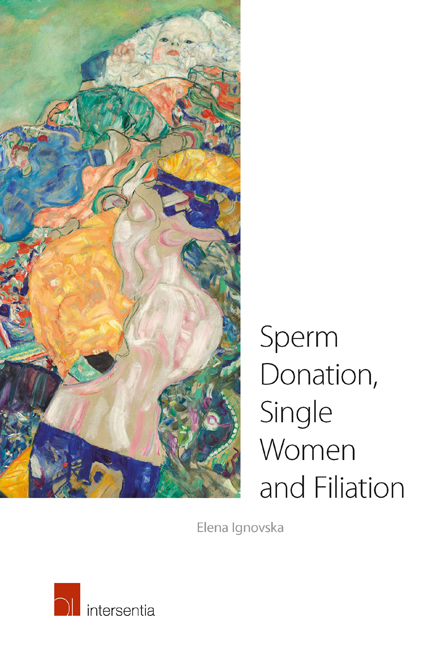Book contents
- Frontmatter
- Dedication
- Foreword
- Contents
- List of Abbreviations
- Introduction
- PART I MAPPING THE TERRAIN FROM AN INTERDISCIPLINARY AND INTERNATIONAL PERSPECTIVE
- PART II THE LEGAL, ETHICAL AND SOCIOLOGICAL POSITIONS OF THE PARTICIPANTS
- Chapter 4 Assisting Single Women to Found Families
- Chapter 5 Sperm Donors as Assistance to Reproduction for Single Women
- Chapter 6 Children Conceived by Sperm Donors’ Assistance to Single Women
- PART III LEGAL WAYS OF ESTABLISHING FATHERHOOD
- References
Chapter 6 - Children Conceived by Sperm Donors’ Assistance to Single Women
from PART II - THE LEGAL, ETHICAL AND SOCIOLOGICAL POSITIONS OF THE PARTICIPANTS
Published online by Cambridge University Press: 12 December 2017
- Frontmatter
- Dedication
- Foreword
- Contents
- List of Abbreviations
- Introduction
- PART I MAPPING THE TERRAIN FROM AN INTERDISCIPLINARY AND INTERNATIONAL PERSPECTIVE
- PART II THE LEGAL, ETHICAL AND SOCIOLOGICAL POSITIONS OF THE PARTICIPANTS
- Chapter 4 Assisting Single Women to Found Families
- Chapter 5 Sperm Donors as Assistance to Reproduction for Single Women
- Chapter 6 Children Conceived by Sperm Donors’ Assistance to Single Women
- PART III LEGAL WAYS OF ESTABLISHING FATHERHOOD
- References
Summary
The CRC defines a child as “every human being below the age of eighteen years unless under the law applicable to the child, majority is attained earlier”. This construction leaves the beginning of childhood open, for purposes of not confronting the everlasting debate when human life and personhood starts, thus not endangering its universal ratification. Nevertheless, the Preamble of the Convention shows continuation of the tradition of the 1959 Declaration on the Rights of the Child, and explicitly takes over the statement that “the child by reason of his physical and mental immaturity needs special safeguards and care, including appropriate legal protection before as well as after birth”. This, though, should not interfere with the interpretation of the definition of the child as provided in article 1, leaving it up to the State Parties to decide how they will regulate abortions and family planning.
The term “child” could also be used in relation to the link with the parents and not solely in relation to age. In this sense, the child never ceases to be a child in relation to his/her parents. Nevertheless, it also never becomes the case that a possibility of establishing the link is not provided. Therefore, the issues of parenthood and parental responsibilities are irretrievably related to the child's legal position. As related to its age, the child is entitled in its full capacity to act as an agent for itself after reaching majority, i.e. after ceasing to be a child in the general sense. During discussions of the CRC Committee regarding the concept of the child's evolving capacities it was pointed out that its purpose is not to overpower the child but to emphasise parental responsibilities over their authority. The concept of a child as an active subject of rights (related to articles 5, 12 and 16 CRC) was meant to strengthen the rights of the entire family. Therefore the focus of evolving capacities should not only be on the children's growing autonomy in relation to their parents, but also on their own process of development (articles 6, 27 and 29 CRC).
For some authors, children's rights usually only come into play when they conflict with their parents’ or prospective parents’ rights.
- Type
- Chapter
- Information
- Sperm Donation, Single Women and Filiation , pp. 225 - 266Publisher: IntersentiaPrint publication year: 2015

